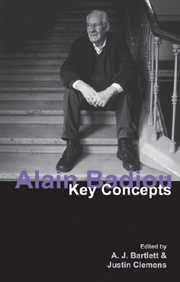Book contents
- Frontmatter
- Contents
- Contributors
- Acknowledgements
- Abbreviations
- Miscellaneous Frontmatter
- Introduction: Badiou's form
- 1 Biography and early works
- PART I THE FOUNDATIONS OF BADIOU'S THOUGHT
- PART II BADIOU'S KEY CONCEPTS OR “CONDITIONS”
- PART III BADIOU'S ENGAGEMENT WITH KEY PHILOSOPHERS
- 10 Plato
- 11 Spinoza
- 12 Kant
- 13 Hegel
- 14 Heidegger
- 15 Lacan
- 16 Deleuze
- 17 New directions
- Afterword: Badiou's futures
- Bibliography
- Index
15 - Lacan
from PART III - BADIOU'S ENGAGEMENT WITH KEY PHILOSOPHERS
- Frontmatter
- Contents
- Contributors
- Acknowledgements
- Abbreviations
- Miscellaneous Frontmatter
- Introduction: Badiou's form
- 1 Biography and early works
- PART I THE FOUNDATIONS OF BADIOU'S THOUGHT
- PART II BADIOU'S KEY CONCEPTS OR “CONDITIONS”
- PART III BADIOU'S ENGAGEMENT WITH KEY PHILOSOPHERS
- 10 Plato
- 11 Spinoza
- 12 Kant
- 13 Hegel
- 14 Heidegger
- 15 Lacan
- 16 Deleuze
- 17 New directions
- Afterword: Badiou's futures
- Bibliography
- Index
Summary
Lacan for us is essential and divisible.
(TS 133)It would be difficult to overestimate the impact of Jacques Lacan's work on Badiou. In the “Formulas of L'Étourdit”, Badiou is blunt: “my guiding thread is going to be, as always, Lacan's relation to philosophy. Ultimately, this is the only thing that interests me” (2006d: 81–2). With regard to philosophy, then, Badiou heeds Lacan – “Psychoanalysis gives us a chance, a chance to start again” (Lacan 2008: 76) – precisely in order to return philosophy to itself. Given that Badiou is not an analyst, an analysand, a theorist of literature, film, culture or the psychology of the social, any examination of Badiou's relation to Lacan has to take this orientation as its guiding thread. In short, Badiou's confrontation with Lacan, the exemplary anti-philosopher, is for philosophy alone.
The scene of the Two
Lacan is the immediate precursor and contemporary whose life and work continually shadow Badiou, the thinker whose own turbulent acts are one model of a form of political activism (E 6–7), whose constant renovation of his own doctrine provides an exemplary practice for thought more generally, and whose radical propositions are to be remorselessly re-interrogated for their import. Badiou admires Lacan's rejection of social consensus, of analysis as normalization, of the pursuit of happiness, and so on. Badiou admires Lacan's institutional courage: Lacan was famously expelled from the International Psychoanalytic Association in 1963 for his clinical innovations, notably the notorious “short-session”; Lacan later set up and then dissolved his own school.
- Type
- Chapter
- Information
- Alain BadiouKey Concepts, pp. 155 - 167Publisher: Acumen PublishingPrint publication year: 2010
- 1
- Cited by

